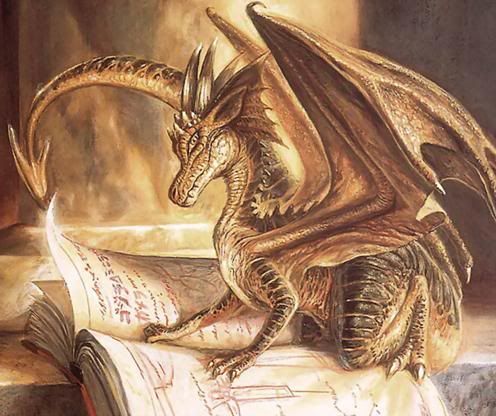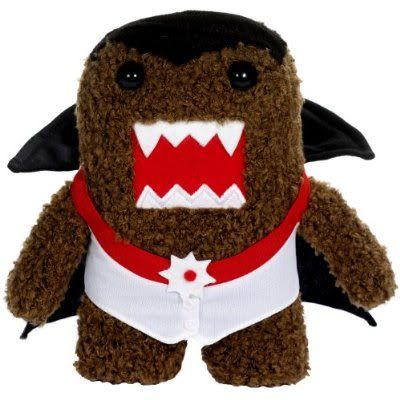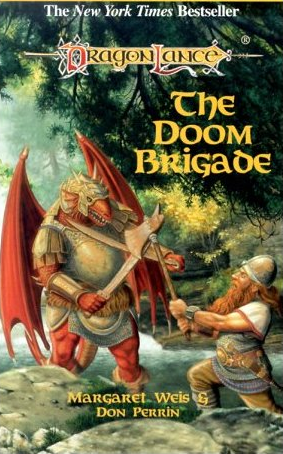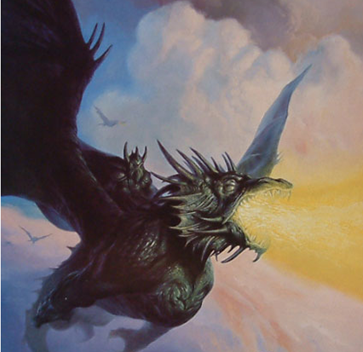
I've been a dragon fan my whole life. There's just something about the flexibility of the dragon image, with so many different shapes and intelligence levels, yet all of them being fundamentally recognizable as a dragon. Compared to many other monsters, there much less of an idea of what a dragon "ought" to be, and so there is a much wider spectrum of possibility without having to deal with flack at the same time.
Books have always been my primary connection to dragon lore, there being comparatively few movies and television series that focus around them. I tend to prefer stories
about dragons rather than stories
with dragons, although I'm flexible. I also enjoy a good coffee-table book of dragon art, although with so much dragon out there, I tend to get picky about designs and styles instead of embracing them all equally.
Here are ten dragon books of various types that helped nurture my interest in winged, fire-breathing reptiles. It's meant to be a personalized list rather than an overview, which is why books like
The Hobbit or the Pern series are not included. I know what role those books played in founding fantasy literature and in determining the common characteristics of modern dragons, but I never
loved them as much as I've done these other books, nor have they had as large an influence on me.
1.
The Black Wing by Mary Kirchoff
The Black Wing is the literal number one, my all-time favourite dragon novel. This is a little embarrassing because it's a Dragonlance novel, that series of Tolkien-knockoff RPG tie-ins that fantasy readers are supposed to use as literary training wheels. However,
The Black Wing is not the typical Dragonlance story, and there are practical as well as nostalgic reasons that it became like that ratty old teddy bear that you wouldn't throw away.
It's about a dragon named Khisanth, who dreams of doing great things but constantly screws up and never learns from her mistakes, and in the end, is exiled to an underground city where she will be killed by incoming heroes. Much of this anti-heroic arc seems unintentional, more a matter of the writer throwing out random plot points, but it makes for a striking contrast to most RPG tie-in novels, and justifies my interest. Clichéd fantasy rarely has characters who suffer from a complete lack of self-awareness, and whose endings amount to such mundane bleakness.
This and other factors make my favourite dragon in all of fiction. It's primarily because her story is so different from any other dragon story I've read, but also for her vivid personality, which is a combination of a bratty child's and a sadistic carnivore's. Khisanth also still has a dragon's traditional power and menace, providing an intriguing contrast to her constant failures, and satisfying my usual urge to have dragons who are to a point imposing. Khisanth basically defines what I wanted to see from sapient dragons: provided with a sense of power, but also with flawed "human" personalities.
Funnily,
The Black Wing is actually a prequel. Khisanth originally appeared in
Dragons of Autumn Twilight, the first Dragonlance novel, in which she was a generic obstacle for the heroes to defeat. Her backstory and motivation was apparently invented whole cloth by
The Black Wing, and is one of the few times when something like that worked. It was only years later that I discovered this, and Khisnath's entire story came together:
The Black Wing was just counting down to her ignominious death. I would prefer
The Black Wing to have been original and self-contained, but you can't have everything. As it is, the novel can be read while knowing nothing of Dragonlance history, since the fantasy background is generic enough and the novel gives one all the information they could need, but it misses the completion of Khisanth's folly.
2.
The Iron Dragon's Daughter by Michael Swanwick
I'm cheating a little bit here, since the titular dragon is not the main focus of the book. Rather, he is a dark, perpetual presence in the life of Jane, a human girl stolen to fairyland, which has modernized along with the world outside. However, the mechanical dragon-jet Melanchthon is such an unforgettably devilish presence that I couldn't think of listing my favourite dragon books without acknowledging this novel.
Melanchthon is pure, delicious evil. While he usually does not act directly, he still manipulates. There is nothing cheesy or overwrought about him: a reader believes in his evil utterly and completely. This is especially notable because I swear up and down that I dislike writing dragons as purely saintly or demonic, but Melanchthon manages to get past my defences.
The Iron Dragon's Daughter is also a favourite novel in general. The imagining of modern faerie is strange and vivid, and though the book is very dark and often depraved, it does not feel gratuitously so. Because Jane's final reward is to return home from this bizarre, brooding world,
The Iron Dragon's Daughter is also an excitingly vicious attack on changeling fantasies and pastoral fantasy journeys, but can simply be read as its own very strange story.
3.
Guards! Guards! by Terry Pratchett
Guards! Guards! was the first Discworld novel I ever read. I originally picked it up because of the dragon angle, but stayed with the rest of the series because of how funny and sophisticated it was. This book introduced the original Night Watch characters, including Sam Vimes, and they're great characters, too: the Night Watch books remain my favourite Discworld sub-series.
But, I'll admit, it's still the dragon angle that gives
Guards! Guards! an extra flavour. A typical fantasy dragon is summoned to the city of Ankh-Morpork, to use as a weapon to change the structure of government. But things get out of hand, while the washed-up remains of the City Watch try to deal with the intrusion into their not-really-all-that-fair city.
The novel takes apart the classical dragon story to show just how absurd its aspects are: a functional dragon must either "cheat" the laws of physics by constantly absorbing magic, or be a tiny chemical-filled beastie with a tendency towards exploding. A city gets along (relatively) fine without a dragonslayer-king, or is just screwed up enough to make a dragon its king. The best sacrificial maiden is a middle-aged keeper of dragon kennels, raising small dragons in a parody of championship dog breeding. And so on. It's a well-constructed story with multiple levels of humour and a surprise ending.
4.
Miss Fanshawe and the Great Dragon Adventure by Sue Scullard
This is a picture book that haunted my childhood from grade school onward. Explorer Harriet Fanshawe captures a dragon and her egg for display on the Buckingham Palace grounds, only to have the egg stolen by a pterosaur-bird that Fanshawe chases into the bowels of the Earth. The Earth's core is heated by the constant fire of captured dragons, but Fanshawe manages to rescue the new hatchling and ride him to the surface. Monstrous animals kill the birds pursuing them, until they arrive safely at the Palace, where the dragons are soon set free.
Many pages have a hole in the middle that offers a peek into the next image, with all the art aligning perfectly, such flying doves becoming the pattern upon a giant serpent. The art is wonderful, sumptuously detailed while often being stylized. I was fascinated by the dragons and the ptero-birds, but also the giant serpent, the huge panther with a hide full of eye-spots, and the cobweb-festooned underground city. Some
examples here.
5.
Dragoncharm/
Dragonstorm/
Dragonflame by Graham Edwards
Graham Edward's UK trilogy of novels, billed pompously as "The Ultimate Dragon Saga" details the multi-part transformation of the world from a mythical prehistory into the patterns we know it today, in which most of the cast members are dragons. It begins with a war between magic-using and non-magical dragons, with the main character being the orphan "Natural" dragon Fortune, but soon evolves into the larger storylines, as various dragons try to seize power during these transitions.
My feelings about these are books are mixed. On one hand, the novels suffer from flat characters whose traits and development are often told rather than shown, while many other characters are entirely generic or unchanging. For example, I struggle to describe what kind of personality Fortune actually has, and he is the main character. On the other, there is tremendous imagination put into the imagery and concepts, and I get sucked in time after time. I like these novels, but they're far from flawless.
Other readers might be put off by the very Disney feel to the novels, combining sentimental softness with scenes of livid darkness. These dragons also lack their traditional power, being relatively small creatures (roughly the size of men), and very much at the mercy of the tremendous forces around them. This is deliberate, since the author set out to write something more along the lines of an animal fantasy such as
Watership Down, which includes some presumptions of vulnerability. It doesn't quite sit well with me, but the novels are still entertaining.
6.
The Flight of Dragons by Peter Dickinson
Peter Dickinson's
The Flight of Dragons might be the oldest entry in the "Author Outlines a Concept for a Dragon Species and Places it in a Richly-Illustrated Book" sub-sub genre of dragon books, and it's still one of the best. Modern audiences might be more familiar with his concept as integrated into the Rankin-Bass animated film
The Flight of Dragons, but I would recommend the book to anyone whether or not they've seen the film, since the book goes into far greater detail, and is also a darker and less romantic picture of dragons than the animated version.
Peter Dickisnon's dragons are non-sapient, living dirigibles of sorts, whose fire breath, poisonous blood, and flight ability are all part of an elaborate chemical system inside an almost hollow body. He outlines many of the physical problems inherent to dragons as we imagine them, and the new problems inherent to dragons as he imagines them (they are creatures of great power, but also of a delicate and volatile physiology).
The text is a fascinating read, making its reasoning clear without scientific jargon. Dickinson tries to demonstrate the way that these biological dragon traits have been interpreted in legends, forming a strong picture of an imaginary dragon species. Sometimes he creates traits that seem biologically unsound in order to match with the stories, such as introducing innate cannibalism into an already small population, but it is overall a sound concept.
As a side note, what we consider "dragons" are actually the males of the species, with the females being flightless, amphibious, and humanoid, which will be a disappointment to some female dragon fans, even if Dickinson does explain it. Female dragons are only illustrated twice in the book, and not as clearly.
Wayne Anderson's artwork deserves a special mention. His male dragons are huge, but with fat bodies, finlike wings, and short, thin limbs. While Dickinson presents the illustrations as theoretical constructions (speculating that the tubular shape of a Chinese dragon could actually be more accurate), they match well with his descriptions, not to mention being wonderful on their own. Anderson gives beauty to the unromantic dragon designs, with stylized forms full of eccentric detail. There are plenty of incidental illustrations and page garnishes that are also beautiful, even if they don't match with the text or anything else in the book.
7.
The Book of the Dragon by Ciruelo Carabal (art) and Montse Sant (text)
Unlike
The Flight of Dragons, where the centrepiece is Dickinson's text,
The Book of the Dragon is designed first and foremost to showcase Ciruelo's dragon art. Choosing
The Flight of Dragons to rank higher is not a matter of preferring text over art, however, but because Cireulo's and Montse Sant's conception of dragons is far more typical than Dickinson's, in both visual and written terms.
The art is the book's greatest strength. In contrast to Wayne Anderson's quirky style, the Ciruelo dragon is the quintessential modern dragon: four legs, two bat wings, a sleek body, long muzzle, finned ears, and back-pointing horns. I chose Dickinson's living blimps above these ones because of their uniqueness, but there's also something comforting about the more traditional design, and Ciruelo's is a gorgeously drawn rendition.
However, where the book loses points is in the text. Written by Montse Saint (though the credit is absent from some covers), unclear how much of it was Ciruelo's idea, it is a largely bland overview of a dragon species. The worst parts are the syrupy passages about dragons as saintly figures of unspoilt nature, rendered extinct by nebulous human folly. This image of dragons is as bad as that of dragons as rampaging monsters, since both are too boring and simple.
There's also this weird idea that female dragons are incredibly rare, and that as a result, the male dragons, must "share" the scarce females in a mating flight after which she mates with one, quickly lays an egg, and goes to the next male, a succession in which only one female egg is conceived. As a result of this lack of mates, male dragons develop attachments to human females, which they keep as pampered, bejewelled "pets" and may fall in love with (especially in the case of the soft-hearted Water Dragons). This was likely used to explain several mythological tropes, but it's still creepy and makes no biological sense.
Part of the book is also devoted to retellings of dragon legends, which are often sanitized, or rewritten to include their conceptual dragon species. For example, the legend of Hercules and the Golden Apples has Ladon the dragon survive and lecture the hapless Atlas; retelling the legend of Sybaris explicitly refers to the antagonist as a Water Dragon of Ciruelo's breed. The book also recalls modern dragon stories: Tolkien, Earthsea, and, for some reason, Dragonlance, though these get a few pages each and are filled with inaccuracies.
8.
The Dragon Book: Magical Tales from the Masters of Modern Fantasy edited by Jack Dann and Gardner Dozois
I have read several dragon anthologies over the years, including
Dragon Fantastic, Dragons of Light, Dragons of Darkness, and
A Dragon-Lover's Treasury of the Fantastic. All of them have had great stories, forgettable ones, and bad ones. However,
The Dragon Book, although not perfect, has a notable number of creative and interesting dragon stories, and so needed a place on this list.
9.
Saint George and The Dragon, Retold by Margaret Hodges and illustrated by Trina Schart Hyman, adapted from Edmund Speser's
The Farie Queene
Like many modern dragon fans, I don't have much taste for the standard tale of dragonslaying. It's not about the evil men being mean to the poor saintly dragons, but that it's a pretty simple, white, predictable story. Hodges and Hyman's version of the Saint George legend, however, manages to succeed through the sheer power of Hyman's art, which gives a powerful and somehow melancholy feel to the story, even though there are no surprises in the plot. Hyman's dragon, in particular, though it is only seen on three pages (including the cover) has a striking appearance that makes one consider whether a dragon is best saved for the climax, too majestic to appear otherwise.
10.
A Book Dragon by Don Kushner
We close off this list with something that lacks theoretical artistic merit, and just makes me happy.
A Book Dragon is a children's novel about a young dragon named Nonesuch, who discovers that dragons shrink by not eating (!), and eventually makes his home inside an illuminated manuscript, adopting it as his dragon treasure. He stays with the book as it changes hands throughout human history, chatting sometimes with the spirit of his cynical grandmother. It's a charming little story that speaks to my inner bibliophile, even if the ending involves Nonesuch returning to a large size to devour the man who wants to foreclose the used bookshop that his book now resides in. I can't stand that kind of corporation vs. little guy cheesiness, but it can't spoil the whole book.
Honourable Mentions:
Anne McAffrey and John Howe's
A Diversity of Dragons has sumptuous illustrations by Howe, but there were not enough of them, and frequently featured unappealing squat or wormlike dragons, sometimes appearing only in the corners of drawings. I also didn't like the framing story, where a man who may have a dragon on his property goes to McAffrey for help, and she and her friend Eppie end up taking the farmer on a crash course in dragon stories, trying to determine what the man has found. It just seemed like a weird self-aggrandizement by McAffrey, especially since her own novels are also spotlighted and given an illustration by Howe.
Patricia C. Werde's
Dealing with Dragons is a fun book, and its dragons are likable, but there's not enough that's striking about it as a "dragon story". It's also more Cimorene's story than Kazul's, anyway.
E.E. Knight's
Age of Fire series has some very good ideas, and I love the way the character of the Copper started, but the six novels ultimately feel stretched-out and, despite being very high-concept, mostly unmemorable. So many scenes and character arcs lack ultimate payoff, and many plot threads are tied up too quickly.
Chris Cymri's
Dragon Reforged is like
The Black Wing in that it's a cheap, forgotten novel that manages to tug at a dragon-lover's heartstrings. It's about an android dragon and his quest for humanity, which is a good hook, but the story feels not quite whole. Furthermore, I haven't read the first part of the story, found in the novel,
Dragons Can Only Rust, and I should see them both to make a final decision about their quality.
Jo Walton's
Tooth and Claw does get points for novelty, trying for a Victorian romance starring slightly anthropomorphic dragons, but I didn't feel any strong resonance with it. It's a good novel, just not one I want to put on a pedestal.




